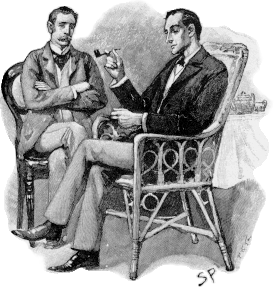Note: this story is an unusual one for King. After reading it, I asked my lovely and talented wife—who is much more familiar with this genre than I am—to read it and provide her thoughts. The reflections below are all hers. (You rock, Michele!)
The story: “The Doctor’s Case,” collected in Nightmares and Dreamscapes. First published in 1987. Wikipedia entry here.
Spoiler-filled synopsis: In this pastiche of Sir Arthur Conan Doyle’s mystery stories, Sherlock Holmes and Doctor Watson are confronted with a challenging “locked room” murder mystery. Surprisingly, it is Watson who cracks the case.
 My thoughts: When Andy asked me to read Stephen King’s short story “The Doctor’s Case,” I was sure it would be too violent for me. I haven’t read anything by King since high school, but my vague recollections suggested to me that he wouldn’t be able to resist getting some gory details in some way or another. I was surprised to find that the extent of the gore consisted of the phrase “There was a dagger in his back.” I’m happy to say I rallied quickly from this assault upon my sensibilities.
My thoughts: When Andy asked me to read Stephen King’s short story “The Doctor’s Case,” I was sure it would be too violent for me. I haven’t read anything by King since high school, but my vague recollections suggested to me that he wouldn’t be able to resist getting some gory details in some way or another. I was surprised to find that the extent of the gore consisted of the phrase “There was a dagger in his back.” I’m happy to say I rallied quickly from this assault upon my sensibilities.
The story is true to the Sherlock Holmes tradition. It is a locked-room mystery with four, and only four, suspects. (I’m partial to this kind of mystery myself: neat and tidy.) The thoroughly nasty Lord Hull, nearing the end of his life, announces to his wife and three sons that he’s just disinherited them in his new will; then locks himself (alone) into his study and dies from a knife in the back.
Most of the time people who try to write in 19th century style give themselves away with anachronisms. King avoids this, for the most part, particularly in correctly using the wordiness and archaic phraseology tossed around in the original stories. I would say the few times it was apparent from the writing that I was not reading something by Conan Doyle were that the explanation of how it was done went on longer than expected, with somewhat too much emoting by Holmes.
I had expected that the fact that Watson and not Holmes solved the case would be due to something unique about his character. This was not the case, and I suspect the fact that Watson got the win on this one might be due to King feeling sorry for the nice old guy.
One amusing moment came at the beginning of the story, when Watson tells us he is now a nonagenarian and he no longer remembered the case very well. He then begins his narrative by noting that “it was a wet, dreary afternoon” just after half past one, and Holmes was staring out the window, holding but not playing his violin, followed by other extremely precise descriptions of conditions and events which had occurred many decades before. This total recall is, of course, an amusing conceit of mystery stories, as well as many other genres.
At one point Holmes references “The Speckled Band” in the course of this story. The solution here is reminiscent of that story, in that it is ridiculously complicated and would almost certainly not work in real life. Fortunately, I like complicated solutions to mysteries, and as a result I enjoyed this story quite a bit.
Thanks, Michele! Next up: “The Man in the Black Suit,” from Everything’s Eventual.